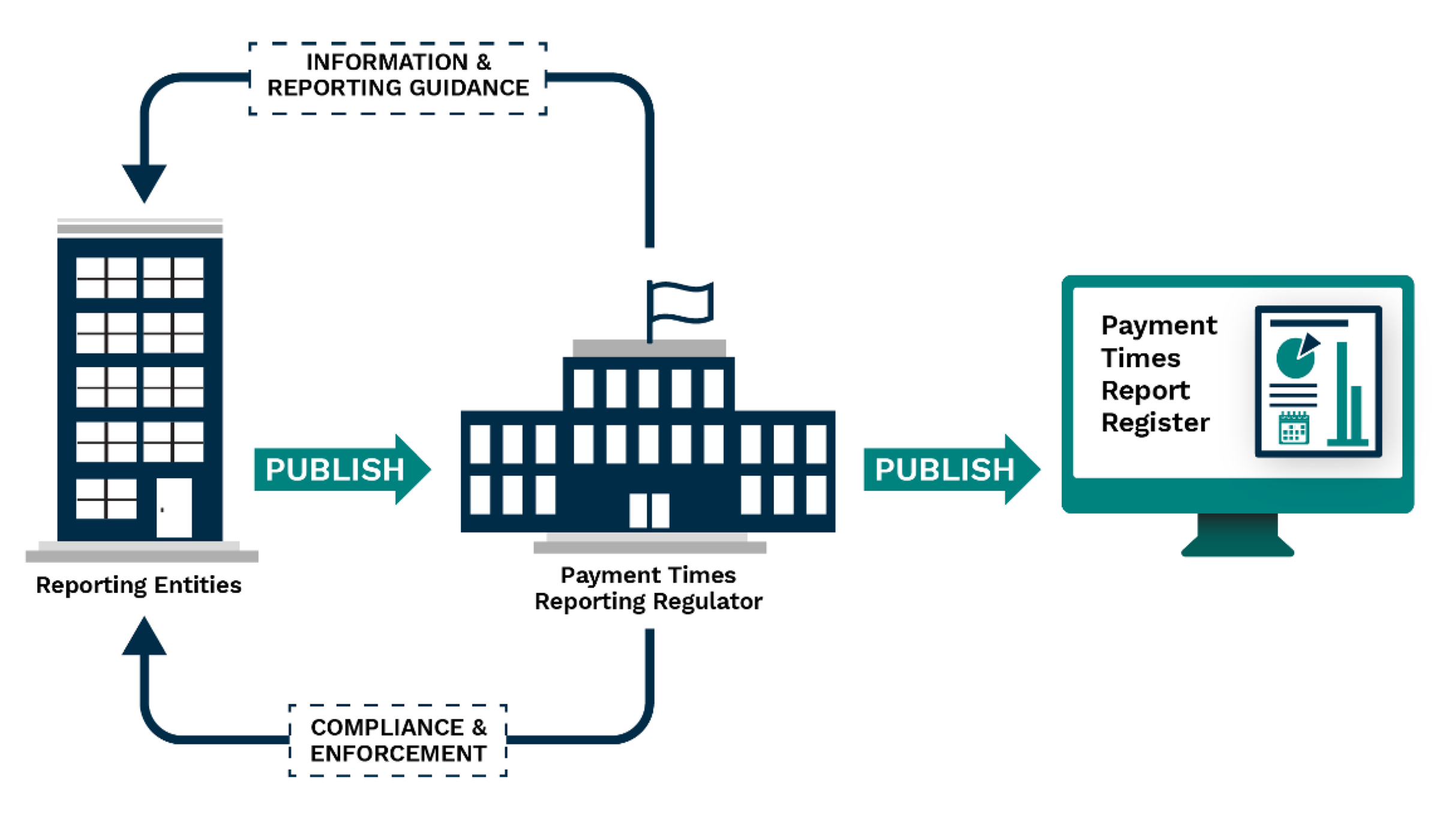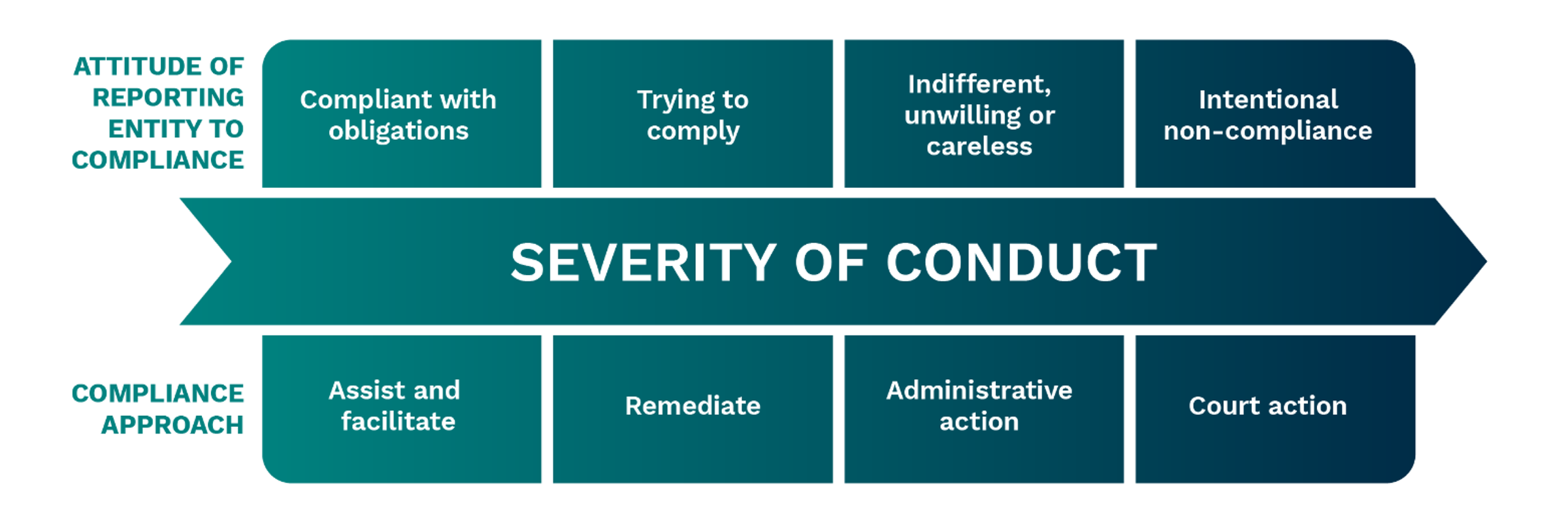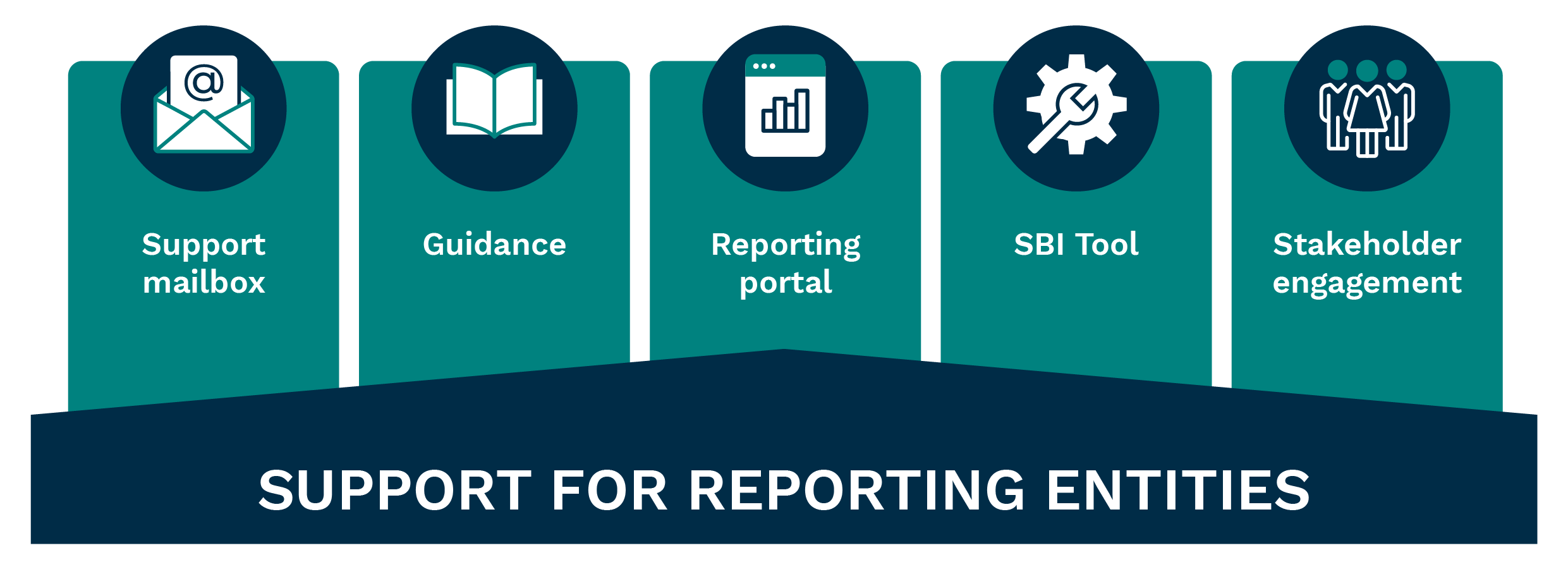On this page
- Our role
- Maintaining the Payment Times Reports Register
- Approach to non-compliance
- Engagement with the Regulator
Our role
Our role is to provide a reliable and transparent source of information about payment terms and performance of large businesses to their small business suppliers operating in Australia.
We publish this information to allow small businesses to make more informed decisions when supplying large businesses and to incentivise large businesses to improve payment terms and practices.
Our functions
The Payment Times Reporting Regulator was established under the Payment Times Reporting Act 2020 (the Act). Our core functions are to receive payment times reports from large businesses every 6 months and publish those reports.
These functions are designed to encourage improved large business payment times by:
- providing transparency on payment terms and performance
- enabling small businesses to assess large businesses performance before agreeing to supply goods or services.
It is not our role to mandate or enforce payment terms and times by large businesses.
We have a range of powers to ensure compliance by reporting entities, including powers to:
- publish details of non-compliance
- undertake an investigation or compliance audit
- issue an infringement notice
- pursue civil penalties.
In addition to our core functions, we must assist large businesses to identify small businesses.

Figure 1: The function of the Payment Times Reporting Regulator.
Regulator principles
Our objectives when regulating payment times reports are to:
- Encourage voluntary compliance by making it easy to comply. Our aim is to make compliance easy by helping entities understand reporting requirements, submit payment times reports, and identify small business suppliers. We look to continually improve the experience and reduce the burden for entities to comply with their obligations.
- Provide a Payment Times Reports Register that is accessible and complete. We recognise the benefits of a Payment Times Reports Register that is reliable, complete, and easy to use. We look to continuously improve and update the register with the most complete information available to help small businesses make informed decisions. This may include publishing non-compliance by entities with reporting obligations.
- Provide a Payment Times Reports Register that is reliable. Reporting entities are responsible for providing us accurate information to publish on the register. We will undertake routine and targeted compliance and data quality activities to ensure information published on the register is accurate.
- Promote improved payment times to small businesses. We seek to improve payment times for small business by providing transparency of payment times performance by large business. We do not mandate or enforce payment times but may publish information concerning the payment terms and performance of specific entities, sectors, or industries.
- Ensure entities with obligations under the Act take those obligations seriously. This includes taking compliance and enforcement action to deter non-compliance, with a focus on continuous, repeated, or intentional non-compliance.
We continuously assess our performance to ensure best practice regulation as provided under the Regulator Performance Guide. In accordance with the guide, we are committed to:
- Continuous improvement and building trust. We look to deliver our functions with an understanding of issues faced by reporting entities when reporting, and to make compliance as easy as possible. We also engage transparently with reporting entities on how we intend on delivering our functions, including during compliance and enforcement activities.
- Being risk-based and data driven. Payment times reports come from a wide range of entities, many with existing reporting obligations under other regulatory regimes. We use data collected under the Act and by other government agencies to reduce regulatory burden by ensuring compliance is targeted efficiently.
- Collaboration and engagement. We understand the complexity and effort needed to meet obligations under the Act will vary for different reporting entities. We welcome feedback from reporting entities and other users of the register to help us improve the delivery of our functions. This includes providing avenues for stakeholder feedback and broad consultation on regulatory guidance.
Maintaining the Payment Times Reports Register
Transparency of reporting
Under the Act we must publish payment times reports and we believe it is important for small business to have transparent access to information as supplied by reporting entities.
Reporting entities may provide details that give a small business context or insight into their payment terms or performance. Where possible, we publish payment times reports in the form they are received from a reporting entity.
Redaction of reports
There are circumstances where we may redact information provided by a reporting entity in a payment times report. We may not publish certain information where the publication is not be in the public interest. This typically includes information that:
- is defamatory, slanderous, or blasphemous
- provides comments or details of specific transactions or suppliers
- contains personal information regarding individuals that are not associated with the reporting entity
- is clearly erroneous or misleading
- passes opinions or comments on the purpose, policies, or requirements for payment times reporting
- is otherwise not in the public interest to publish.
If information is not in the public interest to publish it may be redacted in part or in full.
Other information not published
Some information in payment times reports may not be published because it does not relate to payment terms or performance. For example, we collect contact details of the individual submitting payment times reports for administrative purposes.
We will continuously update our privacy policy and guidance materials, and clearly identify information we do not intend to publish to the register.
Register updates and availability
During ordinary periods we publish payment times reports as soon as practicable.
In peak reporting periods, usually September and March each year, we receive a high volume of reports. To ensure fairness to reporting entities, where we receive a high volume of reports for the same reporting period, publication may be delayed until reports can be released together.
The register is only maintained online and will be provided in multiple formats, including as a downloadable data file and accessible by interactive search tools.
Approach to non-compliance
Non-compliance penalties and enforcement
We do not have powers to modify or reduce the requirements or obligations of reporting entities. We expect entities to take their obligations under the Act seriously and to comply with requirements.
We may take compliance or enforcement action to address non-compliance detected in our compliance activities with a focus on conduct where non-compliance is:
- repeated
- not remediated in a timely manner
- the result of indifference or carelessness by a reporting entity to its obligations
- intentional.
In these cases, we may publish details of non-compliance, undertake an investigation, require a reporting entity to undergo a compliance audit, issue an infringement notice, or commence civil penalty action.
We take an escalating approach to use of our compliance and enforcement tools. Where entities act in good faith and demonstrate a willingness to comply, we will facilitate compliance and remediation.

Figure 2: The Payment Times Reporting Regulator's approach to compliance and enforcement.
Publication of non-compliance
Our objectives when maintaining the register include that it be accessible, complete, and reliable.
We intend on using powers to publish details regarding non-compliance to provide small business with as much information as possible to make an informed decision. We believe it may be relevant to small business when deciding to supply a large business that it has not been transparent regarding its historical payment terms and performance.
If non-compliance by a reporting entity is not remediated in a timely manner, we may publish details of the non-compliance to inform users of the register while continuing to consider escalation and the use of other compliance and enforcement tools.
This may mean reporting a entity will have details of its non-compliance published before commencement of other compliance and enforcement activities, such as investigations and audits. It may also mean that details of historical non-compliance may continue to be publicly available after remediation.
Report quality and assurance
To ensure information published on the register is accurate and reliable, we will undertake data-driven quality and assurance programs. These programs will be aimed at identifying and remediating inaccurate or misleading reports.
We may use compliance powers for these programs to ensure payment times reports are accurate by verifying the calculation and preparation process used by a reporting entity. These programs are retrospective and may apply to reports already published on the register.
If a report is identified as misleading, we may take additional compliance or enforcement steps regarding the report.
Support for reporting entities
An entity may be required to give a payment times report because of its legal structure and meeting certain financial thresholds or because it has opted-in to report under the scheme. This means the size and circumstances of reporting entities can vary.
We understand the complexity of reporting obligations affects reporting entities differently and we undertake to continuously improve guidance material and reporting systems, including the reporting portal and Small Business Identification Tool, based on feedback from reporting entities.
When practicable, we ensure guidance materials are available for public consultation prior to implementation. We aim to ensure guidance is timely and helpful for reporting entities while also clear and transparent on the requirements of the Act and our expectations.
We will also maintain publicly available channels for reporting entities to make enquiries on the interpretation of policies and guidance, however we will not provide legal or other professional advice.

Figure 3: The support options available to reporting entities.
Applications
We have powers to assist reporting entities to achieve compliance by:
- accepting revised payment times reports
- giving an extension of time to provide a report
- redacting certain information from a report.
When reviewing applications to use these powers we will consider whether the request is within the scope of our powers and the mandatory considerations of the Act. In some cases, powers may be limited to specified circumstances.
When making an application requesting we use these powers, reporting entities should be fulsome, clear and transparent on the reasons for the application and ensure it is made in a timely manner. Where applications are made with insufficient information or outside of statutory time limits, we may not be able to provide the relief sought.
Engagement with the Regulator
Stakeholder engagement
When engaging with reporting entities, small businesses and their respective advisors and representatives, we use the following guidelines:
- Ensure engagements concerning policies, guidance and our regulatory approach are broad and inclusive.
- Provide opportunities for liaison with stakeholders to collect feedback to drive continuous improvement.
- Provide avenues for feedback and enquiries from reporting entities and their advisors for report-related queries. Prioritise businesses seeking to comply with their obligations.
- Where practicable, undertake public consultations on policies and guidance materials prior to implementation.
- Where possible, provide advanced notice of system limitations, including when services may be unavailable for upgrades or other reasons.
Reports of non-compliance
We encourage reports of non-compliance from small businesses, company officers and employees, and members of the public. We will assess and triage reports of non-compliance from any source, even when made anonymously via our support mailbox support@paymenttimes.gov.au
Protected information
Protected information obtained under the Act that is included in payment times reports may be published on the register. However, the use or disclosure of protected information in other circumstances may be restricted. We will only share protected information in accordance with the requirements of the Act and, in the case of protected information that is personal information, in accordance with Treasury's privacy policies.
We may be limited in some cases on the information we can share with reporting entities and the public regarding the scheme.
Review of decisions
Reporting entities can apply for a review of certain decisions. For more information on how to request a review of a decision please visit Reviewing a decision.
